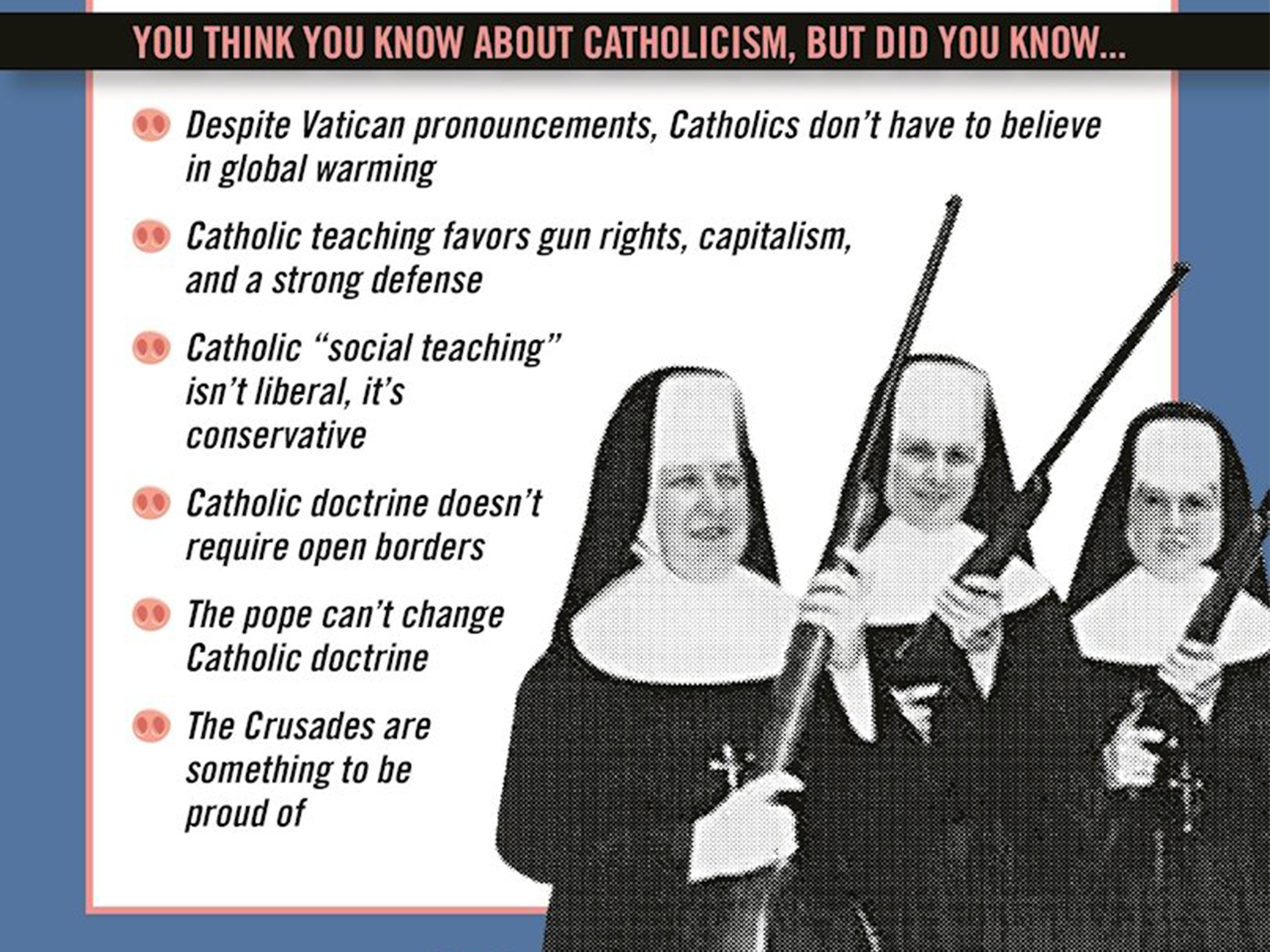The Politically Incorrect Guide to Catholicism
John Zmirak
Regnery Publishing, 2016
256 pages
$13.45
 Scurry out and buy two copies of John “Bad Catholic” Zmirak’s The Politically Incorrect Guide to Catholicism. Keep one for yourself, and give the other to your priest or clergyman (despite the title, this book is for all Christians). Be quick: get it to him before the election.
Scurry out and buy two copies of John “Bad Catholic” Zmirak’s The Politically Incorrect Guide to Catholicism. Keep one for yourself, and give the other to your priest or clergyman (despite the title, this book is for all Christians). Be quick: get it to him before the election.
If you have a clergywoman, buy three copies, because she might throw the first one out the window.
Cringe at that (anemic) joke, did you? Then, boy howdy, do you need Zmirak’s book. Hyper-sensitivity to trivial and imagined sleights, and the notion that any disagreement to the prevailing progressive ideology is immoral, are the hallmarks of our age. It’s pleasant to discover somebody who isn’t buying it.
Here is a partial list of the politically incorrect opinions Zmirak outlines. Catholics, and by extension all Christians, can’t support socialism. Catholics cannot support abortion in any form. Catholics can’t be personally against abortion but be happy to vote for it for the sake of others who do support it. Catholics must especially eschew artificial means of preventing conception. Catholics can own guns and use them to defend themselves against maniacal intruders, even if those maniacal intruders are amnesty-seeking immigrants, and even if those amnesty-seeking immigrants are Muslims. Catholics don’t have to support wide open borders, nor do they have to believe in one-world government.
Catholics can support the investment of capital, and can support personal property rights. Catholics can even believe profit is good, while simultaneously professing the love of money is root of all evil. Catholics must believe same-sex “weddings” are evil and they must not participate in them. Catholics must also say that homosexual acts are sins that cry out to heaven. Catholics can support a just war and the death penalty. Catholics can be proud of the Crusades. Catholics can and should support good science. But no Catholic is obligated to support bad science, and this is so even if it the pope himself who is touting the bad science.
No Catholic is obligated to believe everything the pope said, especially if what he said is a flippant remark made on a low-oxygen aluminum tube hurtling through the atmosphere. Personal incredulity is even more justified if the remark appears to go against centuries of Magisterial teaching.
No Catholic must profess that every pope is above average. We must even admit that some popes have even been heretics.
But how do you know which statements made by a pope require assent? All ex cathedra ones do, as most know; but these pronouncements are vanishingly rare. They are so few that Zmirak can list them all in a paragraph, of which there is universal agreement on only two. All the rest have to be weighed against both the Extraordinary Magisterium and Ordinary Magisterium of the Church.
The former “is the infallible teaching authority vested in popes and councils when they define dogmas”, while the latter “refers to the pope’s and bishop’s authority to pass along the teachings of Christianity that came down to us from the apostles”.
Yet for the regular guy in the pew, it isn’t always easy to figure out what a talkative pope is trying to say, since most of us are not up on Canon Law and Church encyclicals. Look, listen, and heed when a pope, in his official capacity, speaks on faith and morals, yes, but how do we weigh all those other statements?
We have “the moral law written on our hearts”, and that helps, though some confuse the law with “feelings”. And we do have men like Zmirak to help us sort it out. As an example: “[i]t is intrinsically impossible for the pope, as pope, to speak with authority on the details of climate science” (emphasis mine). And “Christ never intended the papacy to serve an oracular function on current events, party politics, and the details of economics.” The chapters of the book where Zmirak leads us through these difficult, given current events, necessary subjects are the best.
Every taboo subject—many of which are mentioned at the opening of this review—is given a thorough treatment and justification. There is plenty of ammunition here for the Christian ready to fight back against not just the secular culture, but against Christians anxious to embrace the increasingly neo-pagan world. There is not only the wealth of material Zmirak’s provides, but there is also his many recommendations and pointers to crucial literature.
What’s that? Did I say fight back? Is that still possible when, except for pockets of resistance, we used only to steady retreat? Listen: there is only so far you can run before you come to a cliff. This is why Zmirak does not support the so-called Benedict Option. But he well understands the exhaustion of those who have been manning the ramparts for decades. “[L]ike you, I am bone tired…You’re sick of it all. You just want to hang around with your fellow Christians and live your life in peace.”
But think of this: “there is nowhere to hide, no ghetto so obscure that the gay totalitarians will leave you alone…Persecution…is coming here soon, if we don’t fight tooth and nail…The anti-religious Left has tasted blood, and intends to feed.”
If you have any doubts about whether to withdraw from public life or to reassert the superiority of Christianity, remember what America’s best general, George S. Patton, said. “Nobody ever defended anything successfully, there is only attack and attack and attack some more.”


